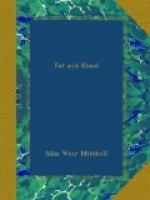It will have been seen that I am careful in the selection of cases for this treatment. Conducted under the best circumstances for success, it involves a good deal that is costly. Neither does it answer as well, and for obvious reasons, in hospital wards; and this is most true in regard to persons who are demonstratively hysterical. As a rule, the worse the case, the more emaciated, the more easy is it to manage, to control, and to cure. It is, as Playfair remarks, the half-ill who constitute the difficult cases.
I am also very careful as to being sure of the absence of certain forms of organic disease before flattering myself with the probability of success. But not all organic troubles forbid the use of this treatment. Advanced Bright’s disease does, though the early stages of contracted kidney are decidedly benefited by it, if proper diet be prescribed; but intestinal troubles which are not tubercular or malignant do not; nor do moderate signs of chronic pulmonary deposits, or bronchitis.[13]
Some special consideration needs to be given to the subject of heart-disease. Especially in cases of broken compensation, by lessening the work required of the heart so that it needs to beat both less often and with less force, the simple maintenance of the recumbent position is a great aid to recovery, and massage properly used will still further relieve the heart. Disturbed compensation is usually accompanied by failure of nutrition, often by distinct anaemia, and these and the anxiety which naturally enough affects the mind of a person with cardiac disorder are all best handled, at first at least, by quiet and rest. Later, the methods of Schott, baths and resistance movements, may carry the improvement further. Even in old and established cases of valvular disease much may be done if the patient have confidence and the physician courage enough to insist upon a sufficient length of rest. The palpitation and dyspnoea of exophthalmic goitre are promptly helped by rest and massage, and with other suitable measures added, cures may be effected even in this intractable ailment.
In former editions I have advised against any attempt to treat the true melancholias, which are not mere depression of spirits from loss of all hope of relief, by this method, but wider experience has convinced me that rest and seclusion may often be successfully prescribed to a certain extent and in certain cases.
Those in which the most good has been done have been the cases of agitated melancholia with attacks, more or less clearly periodic, of excitement, during which their delusions take acuter hold of them and drive them to wild extravagance of noisy talk and bodily restlessness. Whether such patients must be put to bed or not one must judge in each instance, taking into account the general nutrition. In my own practice I certainly do put them to bed now much oftener than formerly. It is not desirable to keep them there for the six or eight weeks which full treatment would demand. Usually it will be of advantage to order, say, two weeks of “absolute rest,” observing the usual precautions about getting the patient up, prescribing bed again when the early signs of an attack of agitation appear, and keeping him there for a couple of days on each occasion, during which the full schedule of treatment is to be minutely carried out.




